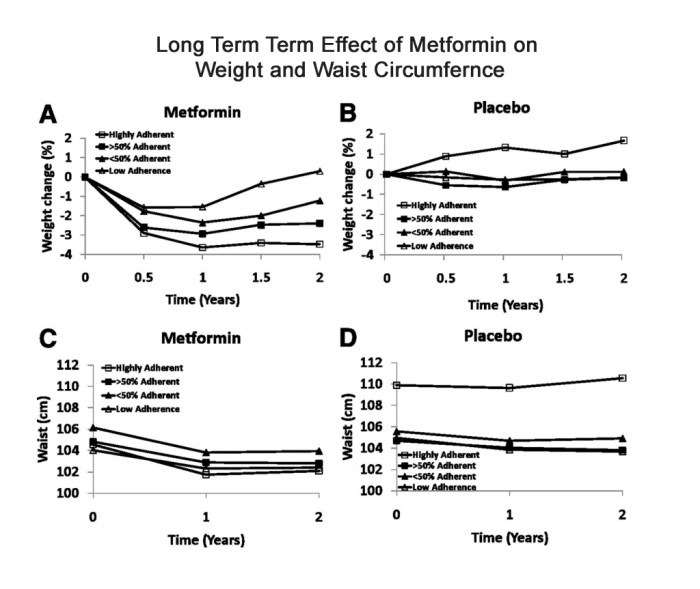Metformin weight loss has emerged as a potential avenue for managing obesity, a growing global health concern. This medication, primarily known for its role in diabetes management, has shown promising results in reducing body weight in both clinical studies and real-world settings. Its mechanism of action, which involves influencing insulin sensitivity and glucose metabolism, may contribute to its weight-loss effects. While metformin offers a potential solution, it’s crucial to understand its nuances, including potential side effects, interactions, and individual variations in response. This guide delves into the science behind metformin weight loss, exploring its benefits, limitations, and practical considerations.
This comprehensive exploration aims to provide a clear understanding of metformin’s role in weight management, empowering individuals to make informed decisions about their health and well-being. By navigating the intricacies of this medication, we can better assess its suitability and potential impact on our weight loss journey.
Metformin

Metformin is a medication commonly prescribed for type 2 diabetes. It’s also gaining popularity for its potential benefits in weight management. While it primarily targets blood sugar regulation, its impact on weight loss is a topic of ongoing research and discussion.
Mechanism of Action
Metformin works by primarily targeting the liver, muscles, and intestines. It’s a biguanide, a class of drugs that primarily decrease hepatic glucose production. Here’s a breakdown of how it works:
* Decreased Hepatic Glucose Production: Metformin inhibits gluconeogenesis, the process by which the liver produces glucose from non-carbohydrate sources. This reduces the amount of glucose released into the bloodstream, lowering blood sugar levels.
* Increased Insulin Sensitivity: Metformin enhances the body’s response to insulin, making it more effective at taking glucose from the bloodstream into cells for energy.
* Delayed Intestinal Glucose Absorption: Metformin slows down the absorption of glucose from the intestines, further reducing the amount of glucose entering the bloodstream.
* Potential Effects on Weight Loss: While not its primary function, metformin can promote weight loss in several ways. It can reduce appetite, increase satiety, and potentially influence the gut microbiome, which may play a role in weight management.
Historical Use in Diabetes Management, Metformin weight loss
Metformin has a long history of use in diabetes management. It was first introduced in the 1950s and has been a cornerstone of type 2 diabetes treatment for decades.
* Early Research: Early studies focused on its effectiveness in controlling blood sugar levels in patients with type 2 diabetes.
* Long-Term Efficacy: Long-term studies have demonstrated its safety and effectiveness in managing blood sugar, even over extended periods.
* First-Line Treatment: Metformin is often considered the first-line treatment for type 2 diabetes, particularly for patients who are overweight or obese.
Pharmacological Properties
Metformin is a well-characterized medication with specific pharmacological properties. Here’s a summary:
* Oral Administration: Metformin is taken orally, typically as a tablet or extended-release capsule.
* Bioavailability: It has moderate bioavailability, meaning that a portion of the drug is absorbed into the bloodstream.
* Distribution: Metformin distributes throughout the body, primarily reaching the liver, muscles, and intestines.
* Metabolism: It is not significantly metabolized in the body.
* Excretion: Metformin is primarily excreted unchanged in the urine.
Metformin and Weight Loss
Metformin, a medication primarily used to manage type 2 diabetes, has also gained attention for its potential weight loss benefits. While its primary function is to regulate blood sugar levels, research has shown that metformin can also contribute to weight reduction in individuals with and without diabetes.
Metformin’s Impact on Body Weight
Numerous studies have investigated the effects of metformin on body weight. These studies have consistently demonstrated a modest but significant weight loss in individuals taking metformin, even in those without diabetes.
A meta-analysis of 20 studies involving over 2,000 participants found that metformin led to an average weight loss of 2.5 kg (5.5 lbs) compared to placebo.
While the magnitude of weight loss may vary depending on individual factors such as initial weight, lifestyle, and other medications, the findings suggest that metformin can contribute to a reduction in body weight.
Metformin for Weight Loss: Metformin Weight Loss

Metformin, a medication primarily used to manage type 2 diabetes, has gained attention for its potential weight loss benefits. Numerous clinical studies have investigated the efficacy of metformin in promoting weight reduction, shedding light on its mechanisms and potential applications in weight management.
Clinical Trials Investigating Metformin’s Efficacy for Weight Loss
Several clinical trials have examined the impact of metformin on weight loss in individuals with and without diabetes. These studies have provided valuable insights into the drug’s potential as a weight management tool.
- A meta-analysis of 17 randomized controlled trials involving over 2,000 participants found that metformin led to a modest but statistically significant weight loss of approximately 2.5 kg compared to placebo. This analysis suggests that metformin may be effective in promoting weight reduction in individuals with and without diabetes.
- A large-scale study published in the journal “Diabetes Care” examined the effects of metformin on weight loss in over 1,000 individuals with type 2 diabetes. The study found that participants taking metformin experienced a greater reduction in weight compared to those receiving placebo. The study also highlighted that metformin’s weight loss effects were more pronounced in individuals with higher body mass index (BMI).
- Another study published in the journal “Obesity” investigated the effects of metformin on weight loss in individuals with obesity and polycystic ovary syndrome (PCOS). The study found that metformin significantly reduced weight, body mass index (BMI), and waist circumference in individuals with PCOS compared to placebo. This finding suggests that metformin may be particularly beneficial for weight management in individuals with PCOS.
Comparing and Contrasting Results of Different Studies
While numerous studies have demonstrated the potential benefits of metformin for weight loss, it’s important to consider the variability in results across different studies.
- The magnitude of weight loss observed in clinical trials has varied depending on factors such as the study population, dosage of metformin, and duration of treatment. Some studies have reported greater weight loss compared to others, indicating the need for further research to optimize metformin’s efficacy for weight management.
- Studies have also shown that metformin’s weight loss effects may be more pronounced in certain subgroups, such as individuals with type 2 diabetes or PCOS. Further research is needed to determine the optimal patient populations for metformin-based weight loss interventions.
- While metformin has been shown to promote weight loss, it’s crucial to note that its effects are generally modest and may not be suitable for all individuals seeking significant weight reduction. Combining metformin with lifestyle modifications, such as diet and exercise, may enhance its weight loss potential.
Analyzing Potential Benefits and Limitations of Using Metformin for Weight Loss
Metformin’s potential benefits for weight loss include its ability to reduce insulin resistance, increase satiety, and potentially alter gut microbiota composition. However, it’s essential to acknowledge potential limitations associated with metformin use.
- Metformin’s weight loss effects are generally modest and may not be substantial enough for individuals seeking significant weight reduction. It’s often recommended to combine metformin with lifestyle interventions, such as diet and exercise, to maximize its weight management potential.
- Metformin can cause gastrointestinal side effects, including nausea, vomiting, diarrhea, and abdominal discomfort. These side effects may limit adherence to treatment and impact the effectiveness of metformin for weight loss.
- Metformin is not suitable for all individuals, particularly those with severe kidney or liver disease, or those who are pregnant or breastfeeding. It’s crucial to consult with a healthcare professional to determine if metformin is appropriate for individual needs and circumstances.
Metformin’s potential for weight loss presents a compelling opportunity for individuals seeking to manage their weight. However, it’s essential to approach this medication with a balanced perspective, considering its individual effects, potential side effects, and the need for personalized care. While metformin can be a valuable tool, it’s not a magic bullet for weight loss. Integrating it into a holistic approach that includes lifestyle modifications, such as dietary changes and regular exercise, is key to achieving sustainable results. As research continues to unravel the complexities of metformin and its impact on weight management, we can anticipate further insights into its optimal use and personalized applications.
Metformin, commonly known for its role in managing type 2 diabetes, has also gained attention for its potential weight loss benefits. While it primarily works by improving insulin sensitivity, some studies suggest it can also aid in reducing appetite and increasing energy expenditure. It’s important to note that metformin is not a magic bullet for weight loss and should always be used under the guidance of a healthcare professional.
For those seeking information on other medications, such as enalapril maleate , it’s crucial to consult with a doctor to understand their potential benefits and risks. Ultimately, a healthy lifestyle that includes a balanced diet and regular exercise remains key to achieving sustainable weight loss.